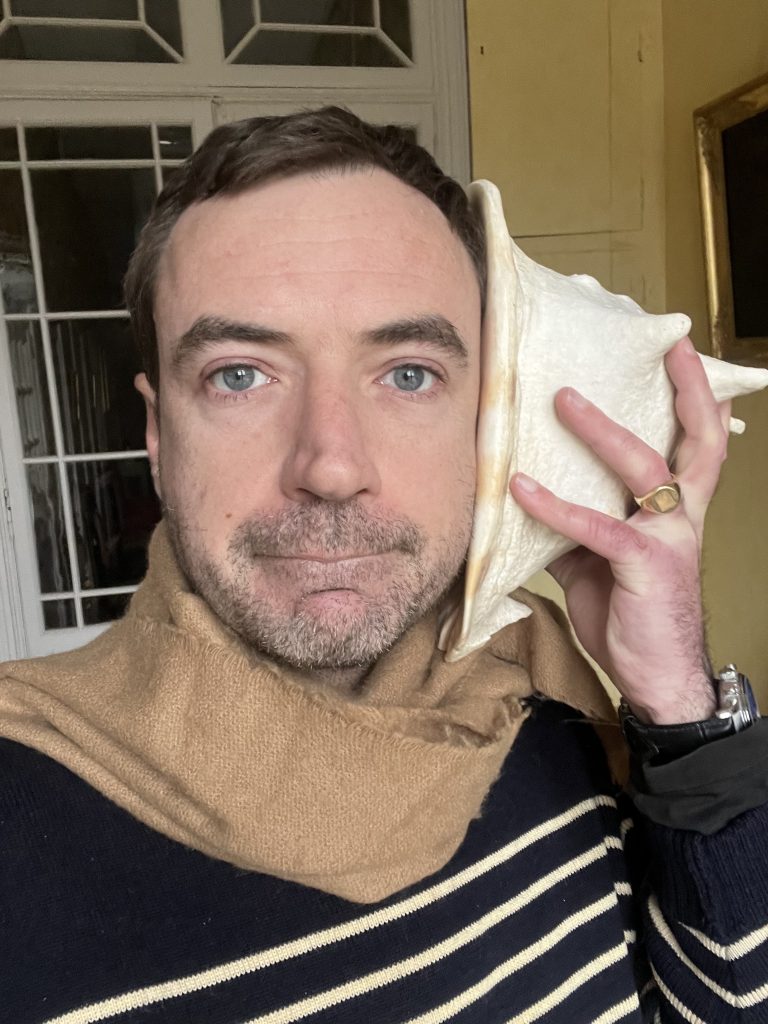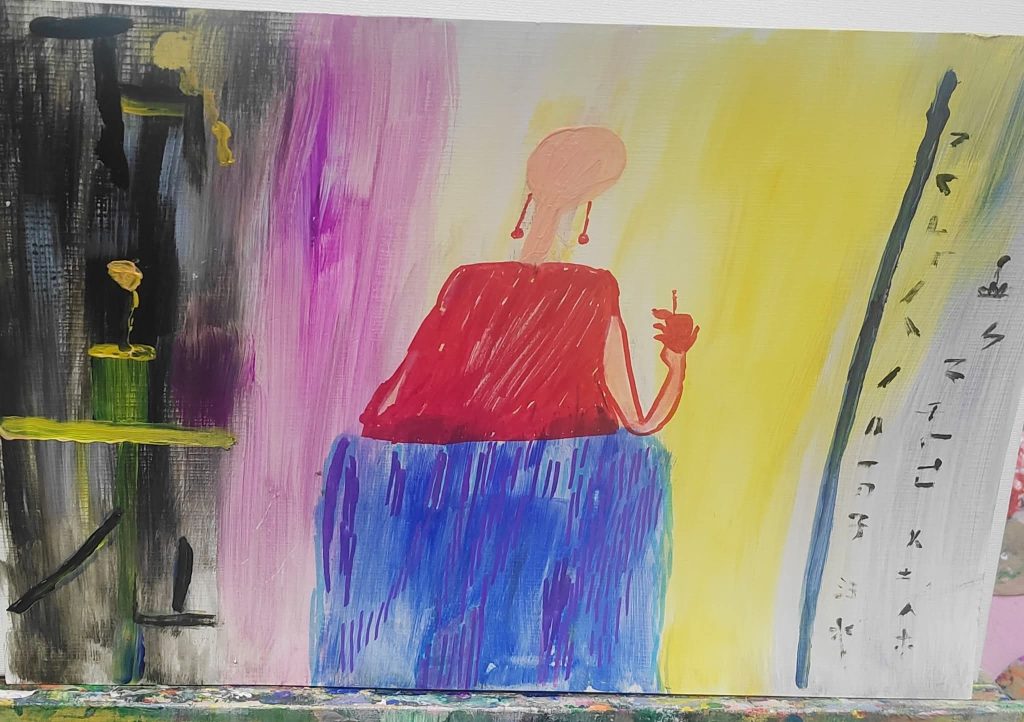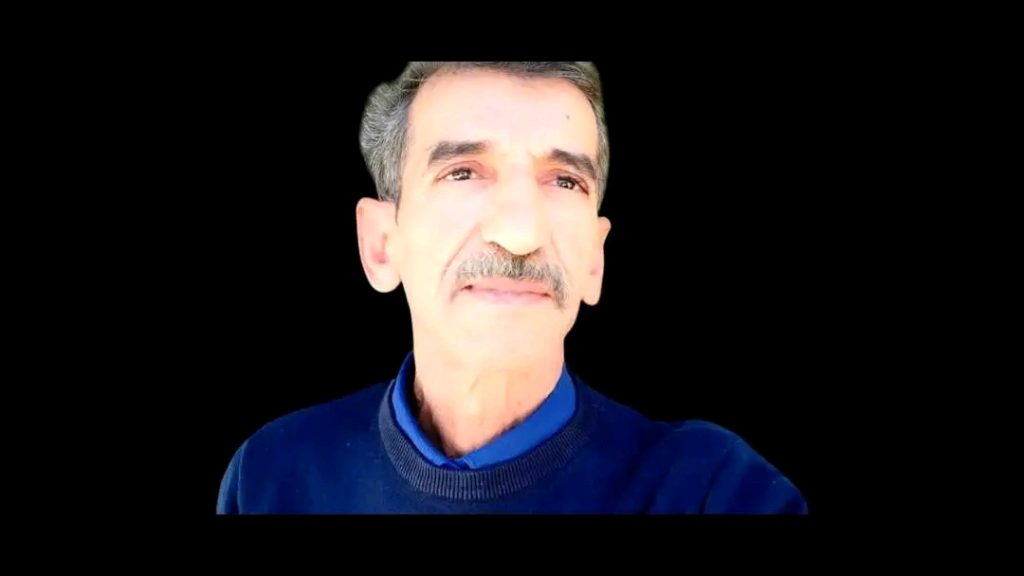2026
He hopes that
2026
Will be kind.
Taylor Dibbert is a poet in Washington, DC. He’s author of, most recently, “On the Rocks.”

2026
He hopes that
2026
Will be kind.
Taylor Dibbert is a poet in Washington, DC. He’s author of, most recently, “On the Rocks.”

An adventurer, at home.
The soft, suave scent, of these burnt lavenders,
Dwells my mind, whilst I quietly write this poem,
In my living room, books and paintings, masks and gems,
Just keep still… All around the silence reigns over.
Blessed be, o Lord ! Thy peace, granted to a poor boy,
Came with the faculty to work, and learn your books…
I can pray now Thy love, in this shrine full of joy,
Rich refuge for my life, which I am glad none took.
There are the jewelry, tailored clothes, lithographs,
Sea shells and silver lamps, ivories, or gold rings…
All reminding of past battles. – My humble being.
Then I will read the Psalms, the Gospels and some Saints !
Before writing a stance, a try, until I faint…
To express gratitude ! As for an epitaph.
*****
A Christian poem.
When I pray Thee o Lord, my voice, humble but proud,
Raise inner, for Thou knows everything of me,
Then I try to write down, speak up, but never loud,
No for we are not much. Before Thy great army.
We are children to Thee, though. Salt grains for the Earth…
We are friends to the birds, colorful like flowers…
We can be good workers, until the last hour,
We can be good servants if we know what we’re worth.
The paradise immense, where will live forever,
Those amongst us who choose to be His believers,
Is like the treasure a peasant finds in a field…
Soon this field acquired, then the riches revealed,
Everyone will think this person has been wise.
Be pious, be gentle, love, hope… – Jesus advises.
*****
The poet plans for work.
You see me now, well quiet, at my library desk !
Director here. Further, I hear cars passing by,
Further, I see grey clouds… The silence is at stake,
Calm, as I read Plato : moments some wish could buy.
Then I take my pen on : I will write for Roma,
For the woman I love, her lips, their aroma…
I will write for Paris, for London, for Madrid,
For a farm in the snow, then for my youth in need.
I want to write again ! For a trip to Jersey,
On a boat, whilst a storm was raging the Channel,
I want to write about hiking, and this tunnel…
In Geneva when I questioned my survival.
I will write about my past girlfriends – when opals,
Drizzled from their glances on our soft Odyssey !
*****
Timothee Bordenave is a French author, a poet, novelist and essayist. He has published many books both in French and English. A part of his writings has been translated to various languages and published internationally.
He is also a visual artist as a photographer and a painter, whose works have also been widely shown, in France like in many other countries around the world.
Born in Paris, France, in 1984, he still lives in France today, partaking his days between the capital town and countryside properties. He first worked as a library director, before shifting to be a fulltime author and artist.
His interest to culture and creativity has brought him to be very active in the local French art community, involving himself notably in the organization of art events for his friends.
Nothing Changes Until You Change
Nothing is changed until you are changed. Many people spend their lives waiting for tomorrow, believing that time itself will improve their situation. They think that one day everything will become better without taking any real action. However, time alone does not create change; only personal effort does.
Imagine that you do nothing except sit in your chair for one hour. What has changed? Almost nothing. You may feel relaxed, but your life remains the same. Now imagine sitting in the same chair for two hours or even longer. Instead of improvement, your body becomes tired, and you may struggle just to stand up. This simple example shows an important truth: doing nothing does not move us forward. In fact, it can slowly harm us. Progress requires action, even if that action is small.
Real change begins when a person decides to act. Every small step taken today shapes the future. Waiting for the “right time” often becomes an excuse for fear or laziness. Time helps only those who move with it, not those who wait for it to pass. If someone wants a different result, they must become a different version of themselves through discipline, effort, and consistency.
In conclusion, life should be lived in the present, not postponed to tomorrow. Understanding that today is the only moment we truly control is the key to success and happiness. Change your actions, and your life will change with them.
Chatgpt also helped me.
I am Ozodbek Yarashov and I live in republic of Karakalpakistan, Turtkul district. I am a young curious person and I am interested in English (in fact, my English is almost C1), and math. In the future, I am going to be a developer, not just a developer, but a developer who changes the world! I always believe in myself. I recommend to everyone, change your thoughts, change yourself!

My Spiritual Home
If I had an acre of fertile land,
A thatched cottage to shield from wind, cold, heat and damp,
Why would I squeeze into the steel and concrete jungle?
No matter how large a house can be measured,
The human heart remains unfathomable.
The fragrance of wildflowers along the path is natural and pure.
Even amidst thousands of houses and lanes, a single glance is enough.
If the heart is filled with light, brightness will abound everywhere.
Lights shine on faces, affairs cater to the powerful and rich.
I’ve wasted my prosperous days in vain,
Touched by the vastness of this worldly way.
I yearn to move to an isolated island,
Watching over the empty wilderness on all sides.
A single ladle of water, a single drink,
Are enough to make my heart turn toward the light.
January 2, 2026, 08:51
Comment: A Search for a Pure Land amidst the Hustle and Bustle
Anna Keiko’s “My Spiritual Home” is like a clear spring, flowing with a deep longing for a pure spiritual world amidst the hustle and bustle of the mundane world, touching and inspiring readers’ hearts.
The imagery in the poem is ingeniously used with strong contrasts. The “acre of fertile land” and the “thatched cottage” form a sharp contrast with the world built of “steel and concrete”. The former is simple and rustic, an ideal haven of peace and freedom; while the latter, though its space can be measured, has an unfathomable human heart, revealing the spiritual emptiness behind material prosperity. The natural fragrance of the “wildflower path” and the worldly disturbances of the “thousands of houses and lanes” further highlight the poet’s yearning for nature and authenticity, as well as her alienation from the utilitarian and mundane.
The emotional expression is sincere and profound. The poet directly conveys her inner belief: “If the heart is filled with light, brightness will abound everywhere”, spreading a positive and uplifting energy and making people believe that inner light can dispel all darkness. Regarding worldly prosperity, the poet laments in无奈 (helplessness), “I’ve wasted my prosperous days in vain, Touched by the vastness of this worldly way.” In a reality where power and wealth reign supreme, her loneliness and confusion are evident, and this emotion can easily resonate with readers.
The artistic conception is profound and full of philosophy. The “yearning to move to an isolated island” is not an escape from reality but a pursuit of inner peace. In the empty wilderness, she can blend with nature and find her true self. “A single ladle of water, a single drink, Are enough to make my heart turn toward the light” reveals that happiness does not lie in material abundance but in inner fulfillment and tranquility, containing profound life wisdom.
The language is simple yet full of charm, without the embellishment of flowery words, yet it can accurately convey emotions and thoughts. “If I had an acre of fertile land, A thatched cottage to shield from wind, cold, heat and damp” is simple and plain but creates a sense of peace and serenity. The rhythm is also natural and harmonious, forming a rhythm through word combinations and sentence patterns, enhancing the poem’s appeal.
“My Spiritual Home” is an excellent work that leads us to stop in the hustle and bustle, examine our inner selves, and pursue that piece of peace and light that belongs to us.


One Horizon for the New Year
At the gate of the year,
we remove our shoes—
the earth is sacred,
wounded by too many names.
From the breath of deserts
to the patience of olive trees,
the world whispers:
enough of division.
O New Year,
teach us the art of return:
return to the human face,
so we may recognize one another
beyond fear and banners.
Let peace be
not a slogan,
but a daily gesture—
bread shared,
a wound listened to.
We were made from one breath,
and to that breath we return,
different in paths,
equal in dignity.
MUSTAQIL TA’LIM METODLARINING O’QUV MOTIVATSIYASIGA TA’SIRI
To’ychiyeva Madinaxon Sherquzi qizi
O’zbekiston davlat jahon tillari universiteti talabasi
ANNOTATSIYA
Mazkur ilmiy maqolada mustaqil ta’lim metodlarining talabalarning o‘quv motivatsiyasiga ta’siri empirik va nazariy jihatdan tahlil qilinadi.Tadqiqot oliy ta’lim muassasasi talabalari ishtirokida
olib borilib, tajriba va nazorat guruhlari asosida amalga oshirildi. Tadqiqot davomida mustaqil ta’lim metodlarining qo‘llanilishi talabalarda ichki motivatsiyani kuchaytirishi, o‘quv faoliyatiga
bo‘lgan qiziqishni oshirishi hamda o‘z-o‘zini boshqarish ko‘nikmalarini rivojlantirishi aniqlandi. Olingan natijalar zamonaviy ta’lim tizimida mustaqil ta’lim metodlarini joriy etish zarurligini ilmiy
asoslab beradi.
ABSTRACT
This scientific article analyzes the impact of independent learning methods on students’ learning motivation from both theoretical and empirical perspectives. The study examines the effectiveness of student-centered learning approaches based on independent learning principles in higher education. The research was conducted among university students using experimental and control groups. The findings indicate that independent learning methods
significantly enhance students’ intrinsic motivation, increase their interest in learning, and improve self-regulated learning skills. The results of this study provide a scientific basis for the systematic implementation of independent learning methods in modern education systems.
KALIT SO’ZLAR
Mustaqil talim, o’quv motivatsiyasiga, ichki motivatsiya, ta’lim samaradorligi, talaba faolligi.
KEYWORDS
Independent learning, learning motivation, intrinsic motivation, self-regulated learning, educational effectiveness.
KIRISH
Bugungi globallashuv va raqamlashtirish sharoitida ta’lim tizimi oldiga yuqori malakali, mustaqil fikrlay oladigan, o‘z bilimini doimiy ravishda rivojlantirib borishga qodir shaxsni shakllantirish vazifasi qo‘yilmoqda. Ushbu jarayonda an’anaviy o‘qitish usullari bilan bir qatorda, alabaning faolligiga asoslangan mustaqil ta’lim metodlari alohida ahamiyat kasb etmoqda.
Mustaqil ta’lim talabaning bilim olish jarayonida tashabbuskorlik ko‘rsatishi, axborotni mustaqil izlab topishi, tahlil qilishi va xulosa chiqarishiga asoslanadi. Bu jarayon o‘z navbatida talabaning
o‘quv motivatsiyasini shakllantirishda muhim omil hisoblanadi. O‘quv motivatsiyasi esa ta’lim jarayonining samaradorligini belgilovchi asosiy psixologik-pedagogik omillardan biridir. Shu nuqtai nazardan, mustaqil ta’lim metodlarining o‘quv motivatsiyasiga ta’sirini o‘rganish dolzarb ilmiy muammo bo‘lib, ushbu tadqiqotning asosiy maqsadi ham aynan ushbu masalani tahlil qilishdan iborat.
INTRODUCTION
In the context of globalization and rapid technological development, modern education systems face the challenge of preparing individuals who are capable of independent thinking, continuous
self-development, and effective decision-making. Higher education institutions are increasingly shifting from teacher-centered instructional models toward student-centered approaches that
emphasize learners’ autonomy and responsibility in the learning process.
Independent learning methods play a crucial role in this transformation. These methods encourage students to take initiative, engage in self-directed knowledge acquisition, and actively
participate in their educational development. As a result, independent learning contributes significantly to the formation of learning motivation, which is one of the key determinants of academic success.
Learning motivation is defined as a combination of internal and external factors that stimulate students’ desire to acquire knowledge and achieve academic goals. Research in educational psychology has shown that intrinsically motivated students demonstrate higher levels of engagement, persistence, and academic achievement.
The main purpose of this research is to examine the impact of independent learning methods on students’ learning motivation and to identify their pedagogical effectiveness in higher education.
METODLAR
Tadqiqot pedagogik tajriba-sinov usulida olib borildi. Unda oliy ta’lim muassasasining 1–2-bosqichida tahsil olayotgan 60 nafar talaba ishtirok etdi. Talabalar tasodifiy tanlash asosida tajriba guruhi va nazorat guruhiga ajratildi.
Tajriba guruhida quyidagi mustaqil ta’lim metodlari qo‘llanildi:
loyiha asosida o‘qitish; muammoli vaziyatlar asosida topshiriqlar;
mustaqil izlanish va taqdimotlar; elektron ta’lim resurslaridan foydalanish; reflektiv tahlil.
Nazorat guruhida esa asosan an’anaviy ma’ruza va tushuntirish metodlari saqlab qolindi. O‘quv motivatsiyasi darajasi tadqiqot boshida va oxirida maxsus so‘rovnoma orqali aniqlanib, statistik
jihatdan solishtirildi.
METHODS
This study employed a mixed-method research design combining both quantitative and qualitative approaches. The research was conducted among 60 undergraduate students enrolled in a higher education institution. Participants were randomly divided into two groups: an experimental group and a control group.
The experimental group was taught using independent learning methods, including:
project-based learning;
problem-based learning tasks;
independent research assignments;
use of digital and electronic learning resources;
reflective analysis and self-assessment activities.
The control group continued learning through traditional teaching methods such as lectures and teacher-led instruction. Learning motivation levels were measured at the beginning and end of
the study using a structured motivation questionnaire adapted for academic contexts. The collected data were analyzed using comparative and descriptive statistical methods to evaluate changes in students’ motivation levels.
NATIJALAR
Tadqiqot natijalari shuni ko‘rsatdiki, tajriba guruhida o‘quv motivatsiyasi darajasi sezilarli darajada oshgan. Talabalarning aksariyati mustaqil topshiriqlar ularning bilimga bo‘lgan
qiziqishini kuchaytirganini ta’kidladilar.
So‘rovnoma natijalariga ko‘ra:tajriba guruhida ichki motivatsiya
ko‘rsatkichlari yuqori bo‘ldi;talabalar o‘z bilimini mustaqil boshqarishga o‘rgandi;o‘quv faoliyatiga nisbatan mas’uliyat hissi kuchaydi. Nazorat guruhida esa motivatsiya ko‘rsatkichlarida sezilarli
o‘zgarish kuzatilmadi.
RESULTS
The results of the study revealed a significant increase in learning motivation among students in the experimental group. Students who participated in independent learning activities demonstrated higher levels of intrinsic motivation, greater responsibility for their learning
outcomes, and stronger engagement in academic tasks.
Survey results indicated that:
students developed a stronger interest in learning activities;
self-regulated learning skills improved noticeably; students became more confident in making independent academic decisions.
In contrast, the control group showed no significant improvement in motivation levels. These findings confirm the effectiveness of independent learning methods in enhancing students’ motivation.
MUHOKAMA
Olingan natijalar mustaqil ta’lim metodlarining o‘quv motivatsiyasini oshirishdagi muhim rolini ko‘rsatadi. Mustaqil ta’lim talabaning shaxsiy ehtiyojlari, qiziqishlari va imkoniyatlarini inobatga olgan holda tashkil etilishi sababli, u ichki motivatsiyani shakllantirishga xizmat qiladi.
Mazkur natijalar Deci va Ryan tomonidan ishlab chiqilgan ichki motivatsiya nazariyasi bilan uyg‘unlikda ekanligini ko‘rsatadi. Shuningdek, Zimmerman tomonidan ilgari surilgan o‘z-o‘zini
boshqaruvchi ta’lim konsepsiyasi ham tadqiqot natijalari bilan tasdiqlandi.
DISCUSSION
The findings of this study support the hypothesis that independent learning methods positively influence students’ learning motivation. By granting learners greater autonomy and responsibility, independent learning fosters intrinsic motivation and promotes deeper engagement in the learning process.
The results align with the Self-Determination Theory proposed by Deci and Ryan, which emphasizes autonomy as a core component of intrinsic motivation. Additionally, the outcomes correspond with Zimmerman’s theory of self-regulated learning, highlighting the importance of learner control and reflective practices.
Independent learning methods not only enhance motivation but also contribute to the development of critical thinking, problem-solving abilities, and lifelong learning skills. Therefore, these methods should be considered essential components of modern pedagogical practice.
XULOSA
Xulosa qilib aytganda, mustaqil ta’lim metodlari zamonaviy ta’lim tizimida o‘quv motivatsiyasini oshirishning samarali vositasi hisoblanadi. Tadqiqot natijalari shuni ko‘rsatdiki, mustaqil ta’limga
asoslangan yondashuv talabalarning bilim olishga bo‘lgan ichki ehtiyojini kuchaytiradi, ularning faolligi va mas’uliyatini oshiradi.
Mustaqil ta’lim metodlari orqali tashkil etilgan ta’lim jarayoni talabaning shaxsiy va kasbiy rivojlanishiga xizmat qiladi. Shu sababli oliy ta’lim muassasalarida mustaqil ta’lim metodlarini tizimli va bosqichma-bosqich joriy etish tavsiya etiladi.
Kelgusida olib boriladigan tadqiqotlar mustaqil ta’lim metodlarining turli fanlar va ta’lim bosqichlarida qo‘llanilishi, shuningdek, ularning uzoq muddatli pedagogik ta’sirini o‘rganishga qaratilishi lozim.
CONCLUSION
In conclusion, independent learning methods represent an effective pedagogical approach for increasing students’ learning motivation in higher education. The study demonstrates that the systematic implementation of independent learning strategies enhances intrinsic motivation, encourages active participation, and strengthens students’ self-regulation skills.
Independent learning transforms students from passive recipients of knowledge into active participants in the educational process. This shift has significant implications for improving educational quality and preparing students for professional and lifelong learning challenges.
Future research should focus on examining the long-term effects of independent learning methods across different academic disciplines and educational levels. Further studies may also explore the integration of digital technologies with independent learning to maximize motivational outcomes.
FOYDALANILGAN ADABIYOTLAR
1. Azizxodjayeva N. Pedagogik texnologiyalar va pedagogik mahorat. – Toshkent, 2018.
2.Zunnunov A. Pedagogika nazariyasi va amaliyoti. – Toshkent: O‘qituvchi, 2020.
3.Deci E., Ryan R. Intrinsic Motivation and Self-Determination in Education. – New York, 2000.
4.Zimmerman B. Self-Regulated Learning and Academic Motivation. – Journal of Educational Psychology, 2002.
5.The Effect of Learning Independence and Motivation on Students’ Learning Outcomes when Implementing Distance Learning.
Masofaviy ta’limda mustaqillik va motivatsiyaning o‘quv natijalariga ta’siri bo‘yicha ilmiy maqola.journal.unismuh.ac.id
6.Development of Students’ Independent Learning Activity: Analysis in the Context of the Cognitive‑Motivative Approach
Mustaqil o‘qish faoliyatini kognitiv‑motivatsion yondashuv kontekstida tahlil qiladigan maqola.
scientificbulletin.com
WINDMILLS INDICTED!
“Windmills are killing all of our beautiful Bald Eagles.”
— Trump’s Truth Social post 12/30/25
Windmills are evil. Our goal:
replace all wind power with coal.
Send men fit and fine
back into the mine.
Black lung and black air? Profit’s toll.
This photo proves eagles get hurt.
It shows one dead bird in the dirt.
A falcon, it’s true—
From Israel’s news…
Trump sounds an off-target alert.
Copyright 12/2025 Patricia Doyne
WHILE FOUNDERS WATCH
Our Founding Fathers have been keeping watch
as 13 colonies transformed to states—
with standing armies, income tax, and parks,
OSHA, public schools, and Medicare…
They watch big bucks turn news to entertainment.
Now who will challenge power with the truth?
Our Founders watch the Constitution twisted—
Watch elections undermined by lies.
Watch a mob attack the Capitol—
then watch as insurrectionists are pardoned.
Watch a rich, convicted felon seize
another term, fill offices with minions.
It took 250 years to build
this country– torn apart in six short months.
Here’s wish list for our country’s health–
a starting point if Congress grows a spine,
resists what Project 2025
is smashing to smithereens with its blunt axe.
1st wish—dismantle ICE and all its tactics.
Lawless private troops with masks and guns
are hallmarks of a dictator. Those seized
deserve due process. Charges must be proved.
A brown face isn’t grounds for deportation.
No one thrives when everyone’s afraid.
Wish 2—throw out those trappings of Versailles:
walls polka-dotted with gold curlicues,
golden garlands, gewgaws, bric-a-brac–
conspicuous consumption at cringe-level.
The White House wasn’t meant to be a palace;
the President wasn’t meant to be king.
3rd wish—send Putin packing; he’s no friend.
But Trump admires dictators, sees strength
where others see a predatory weasel.
So Putin plays Trump like a violin,
might let him build a Trump Tower in Moscow.
And Ukraine’s now a fighter on the ropes.
4th wish—stop branding everything. He’s named
warships, web sites, programs for himself.
“The Trump Peace Center” whitewashes the fact
that Netanyahu dines at Mar-a-Lago,
and Presidential whims spur acts of war.
He seeks more worlds to conquer, and re-name.
This wish list could go on and on and on.
Our Founders’ overriding wish is this:
refocus government so people’s needs
matter more than making rich folks richer:
Of the people, by the people, for the people.
While Founders watch, a revolution simmers…
Copyright 1/2026 Patricia Doyne
DOMESTIC TERRORISM
One campaign promise haunts us these dark days:
deport immigrant killers, rapists, thieves—
a lofty goal, that ICE somehow achieves
at schools, Home Depot parking lots. Displays
of gangland tactics—masks, guns, unmarked cars—
help ICE kidnap, get rid of hapless prey,
with VISAs or without. Wimp laws delay
slamming brown-skinned quotas behind bars.
You arm a bunch of thugs—above the law,
and Feds, so they outrank the local cops—
and someone soon will do something so raw
it sparks a backlash. Video footage pops:
white citizen, unarmed, shot in the face.
So who’s the terrorist? A clear-cut case.
Copyright 1/2026 Patricia Doyne